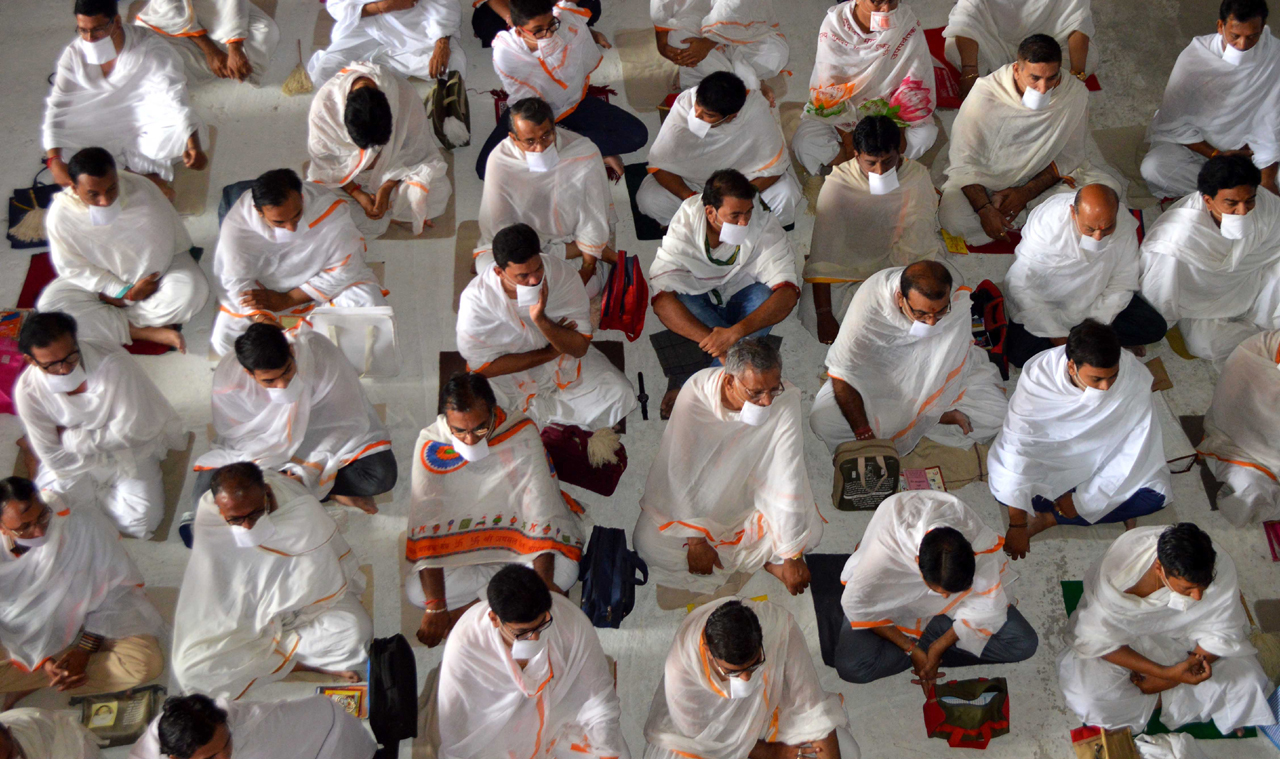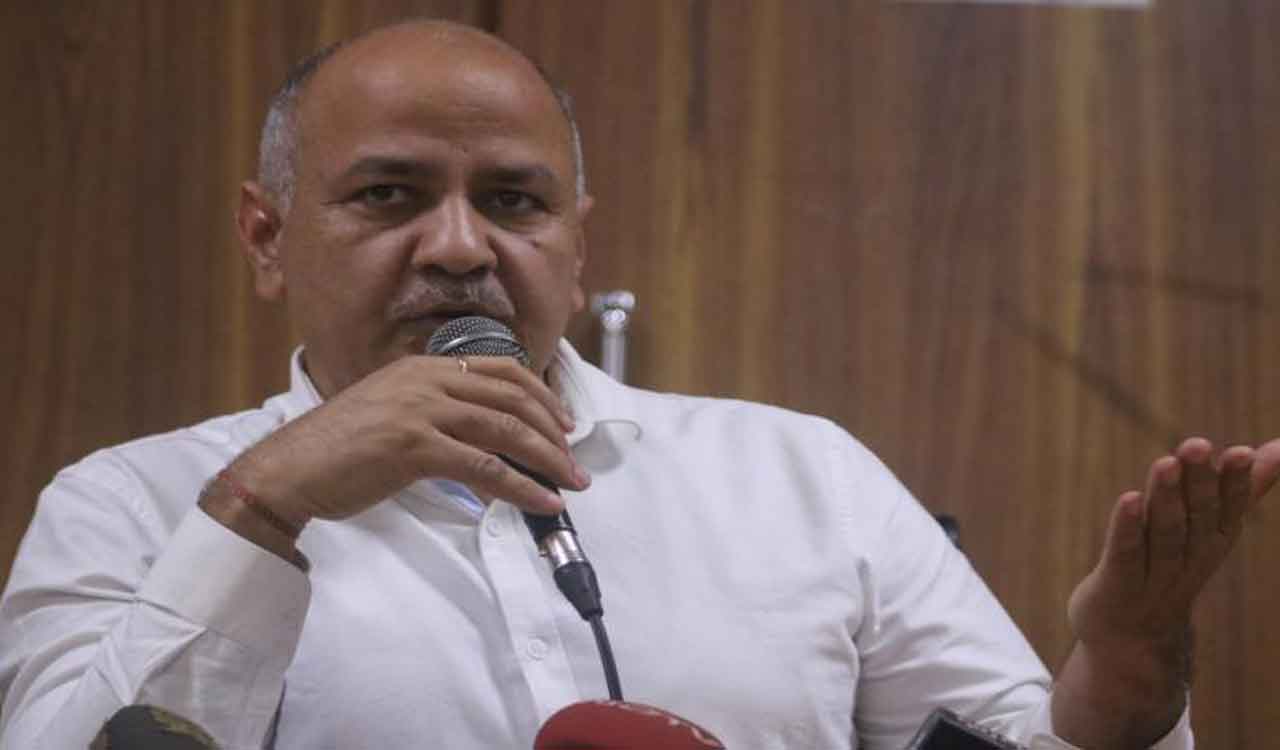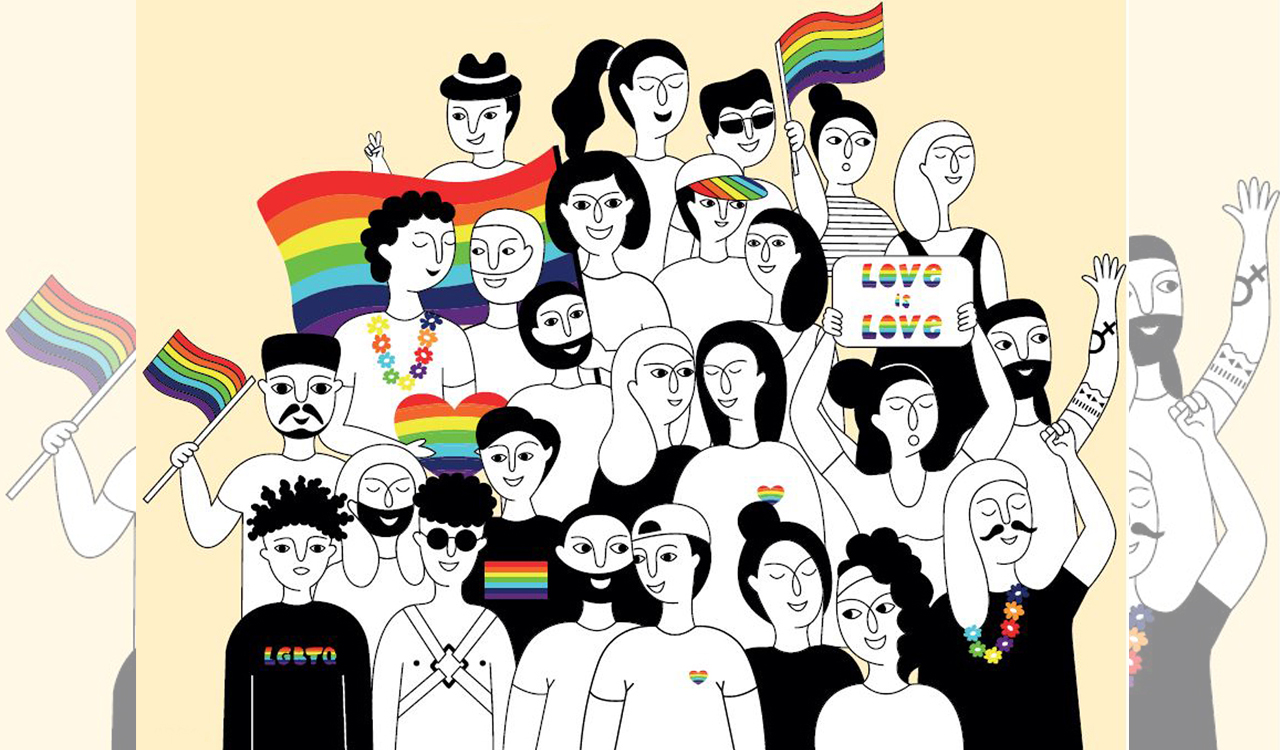
<!–
–>
Laws prohibiting discrimination in employment, housing, healthcare and education can provide a framework for transgender persons to navigate marginality
Published Date – 20 April 2024, 11:36 PM

By Anagha VS, K Ragasuriya, Maheswary S, Prof Gummadi Sridevi
The transgender community has been experiencing the harsh realities of various social, economic, political and cultural marginalisation since ancient times. The Transgender Persons (Protection of Rights) Act, 2019, defines a ‘Transgender person’ as a person whose gender does not match the gender assigned to that person at birth and includes trans-man or trans-woman (whether or not such person has undergone sex reassignment surgery, hormone therapy or laser therapy or such other therapy), a person with intersex variations, genderqueer and person having such socio-cultural identities as Kinner, Hijra, Aravani and Jogta.
Gender identity was perceived as something complex and fell beyond the acceptable social norms of society throughout all times. Discrimination faced by the transgender community has traversed across domains of all life spheres including housing, schooling and employment opportunities (Ganju, et al, 2016). The openings and representation of their community into the labour market were always a source of tension for them and there were cases where even the employed people faced severe forms of isolation and discrimination in the workplace, which forced the majority of them to earn a living through begging, prostitution, etc. (Abdullah, et al, 2012)
Since people are unreasonably afraid of their presence in public spaces, there were instances wheretransgender people had to hide their gender. The unemployment rate among them was also much higher than in other sections of society. Apart from physical, sexual and psychological harassment, the growing hate and aggression towards them made them more vulnerable than before (Amin, et al, 1998).
The Transgender Persons (Protection of Rights) Act, 2019, is a revolutionary step taken by the government, which defines transgender people and ensures the protection of their rights and welfare. To address the social, economic and health concerns of the transgender community, a national action plan for transgenderpersons (2020-25) was launched by the Ministry of Social Justice and Empowerment aimed at ensuring basic provisions for them. Schemes such as Nai Udaan (Ministry of Social Justice and Empowerment) and Financial Assistance Scheme for the Welfare of Transgender Persons (Government of Kerala) support vocational training and employment opportunities for them and provide financial assistance for education, healthcare, self-employment, etc. Karnataka and West Bengal too have introduced a policy and a development board, respectively, which ensure various basic provisions for transgenderpeople.
Studies point out that human rights violations faced by them have diminished economic output and their capacity at the micro-level. Transgender people are receiving less income than non-transgender men (Badgett, et al, 2014). Thus a study on to what extent the labour market is accessible to them and the benefits they can reap out of the labour market is highly relevant.
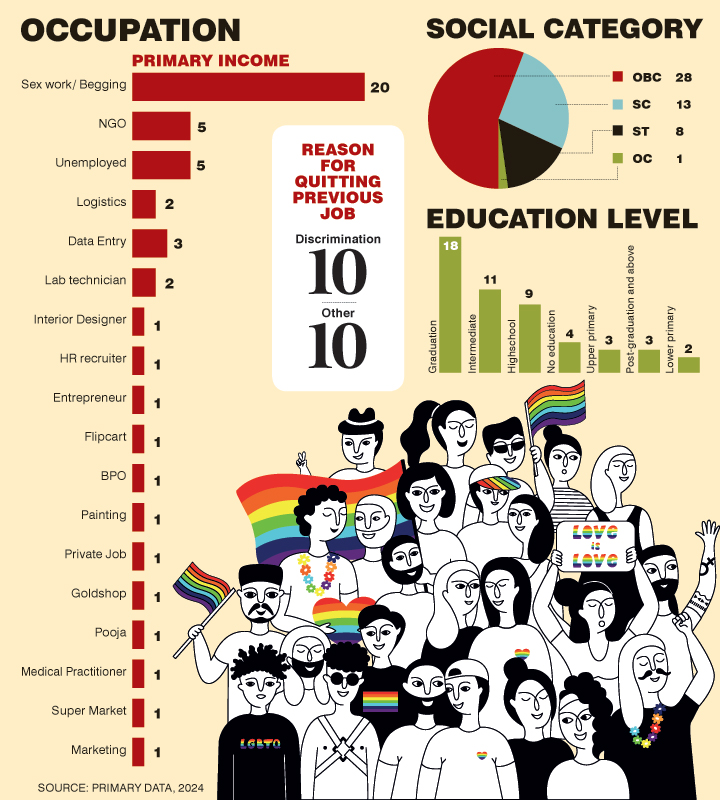
Enduring Discrimination
As part of our Economics of Discrimination coursework, we conducted a primary study on the socioeconomic exclusion experienced by the LGBTQ community. We interviewed 50 participants — 33 individuals identified themselves as transwomen, 16 as gender non-conforming and one as transman. The participants belonged to the Darpan Foundation, a community-based organisation which works for the welfare of the transgender community, in Secunderabad.
The data collected gives insights into the collective weight of discrimination that the community endures and into the existence of various socioeconomic barriers they face in pursuing a career and living a decent life.
Most participants reported living with their parents or in apartments where their neighbours shared the same identity. However, among those who sought housing outside of these environments, a significant number had not yet disclosed their identity to the broader world. “The world is not ready to accept us,” they say.Despite this, a concerning finding emerged with 36% of these individuals experiencing housing discrimination, having been denied housing opportunities. This finding underscores the urgent need for greater societal acceptance and protections for transgender individuals in accessing basic needs such as housing.
Educational Status
The primary educational attainment among the participants is secondary education, with a significant majority falling into this category. Of the 50 surveyed, 18 are graduates, which also indicates a minimal incidence of education denial. However, it’s noteworthy that more than half of the participants reported encountering various forms of discrimination which varied from calling names, to not wanting to engage with them in school activities or negative experiences related to their gender like asking inappropriate questions and unwanted physical touch.
Also, a considerable number of individuals refrained from pursuing further education due to the fear of facing mistreatment or discrimination in educational settings. “I don’t feel comfortable pursuing further education because I know they are going to treat me badly because of who I am,” shared Kumari (name changed), a transwoman who does pooja in a temple for her livelihood. This fear likely contributed to the reluctance among some participants to pursue higher education opportunities, underscoring the pervasive impact of gender-related challenges on educational aspirations and attainment levels.
Is there a barrier?
Many of the participants (20 out of 50) are involved in sex work or begging. Five individuals are unemployed, while another five are employed by NGOs supporting the LGBTQIA+ communities. Among those engaged in sex work and begging, half were forced into these activities, while the other half chose them voluntarily.
Interestingly, individuals who voluntarily opted for sex work or begging expressed a desire to pursue alternative occupations if given an opportunity. This trend is particularly striking considering that most participants possess education levels ranging from intermediate to higher. These findings strongly suggest significant underemployment and issues of entry barriers into the labour market warranting attention.
Though the majority (34 out of 50) stated that they do not feel underemployed, some could recognise being underemployed. The sense of being underemployed often stems from a lack of recognition and the underutilisation of one’s skills. This phenomenon can be linked to the challenging experiences individuals endure during their learning phases.
Moreover, considering that a significant portion (20 out of 50) of the participants reported experiencing some form of sexual assault in the workplace, it’s plausible that such traumatic encounters have had a detrimental impact on their overall productivity. These experiences likely contribute to a sense of disempowerment in the labour market, potentially exacerbating feelings of underemployment.The psychological toll of workplace harassment and assault can hinder individuals from fully engaging and contributing to their work environment, further perpetuating the cycle of underutilisation and dissatisfaction in their employment situations.
The sense of being underemployed often stems from a lack of recognition and the underutilisation of one’s skills
Most participants stated that their monthly income ranged from Rs 10,000 to Rs 20,000. Six respondents were unemployed. A troubling proportion — 18 participants — stated that their income levels were not sufficient to cover their necessities.Even while some of the participantsgenerate a little income, a considerable proportion still faces financial difficulties, with roughly two-fifths of them struggling to make ends meet.Only nine have access to other sources of income and six are either begging or involved in sex work. This highlights the fact that many people choose these jobs because they are easily accessible, highlighting major obstacles to entry into the labour market.
Among the participants engaged in sex work who had previous employment (15 out of 20), a staggering 10 individuals left their previous jobs due to workplace discrimination, including instances of feeling uncomfortable and experiencing rape attempts. “They ask me bad questions — whydo you walk like this, why do you talk like this, what is inside your pants,” adds one. “I can’t ask for a promotion. They made me silent and lonely in the workplace.”
Half of the participants faced the necessity of concealing their gender identity to maintain employment, a stark reminder of the prevailing reluctance among many to openly express their gender identity in the workplace. This reality is closely intertwined with the broader trend observed among the participants where a significant portion remains secretive about their gender identity in society.
Notably, only a minority experienced outright job denial or termination directly linked to their gender identity, primarily because a substantial number of individuals chose to remain silent. These observations underscore the complex interplay between workplace dynamics, societal acceptance and individual choices regarding gender expression.
The necessity of concealing gender identity to maintain employment is a stark reminder of the prevailing reluctance among many to openly express their gender identity in workplace
“I made a promise to my family that I would never undergo transition surgery or reveal my true identity to the outside world. I have to keep that promise.” This response encapsulates the intricate dynamics of Indian society, which remains deeply entrenched in fear and societal expectations.
Little Food Security
Sixty per cent of the participants said they were worried about not having enough food. This worry was made worse by the fact that over half of them (56%) couldn’t get good food because they did not have enough money while an equal number say they don’t eat a variety of foods and 60% say they skip meals. This means they may not have easy access to food and aren’t getting enough nutrients, which can have long-term effects on health. Also, the fact that a lot of transgender people (62%) went to bed hungry and 56% went all day and night without eating points to food insecurity in this group. A majority of them possess ration cards and are at home with their families.
Reducing Prejudice
The study was conducted among merely 50 participants from one city but the results deserve attention. Though coming from different socioeconomic backgrounds, most participants had to go through similar experiences, be it pursuing education or working environments. Even with high educational attainment, being highly underemployed denotes the inaccessibility of the third gender into the labour market due to one non-pecuniary character, their gender. This highlights how the labour market does not merely revolve around productivity.
While such a non-pecuniary characteristic comes into play, indicators such as education and employability take big steps backwards and societal norms and false belief systems take dominance. Our study sheds light on the structural backwardness in the labour market towards the third gender, which isolates them into certain occupations and makes the majority of the other jobs inaccessible to them.
The findings also underscore the challenges faced by individuals within the LGBTQIA+ community, particularly concerning education and employment. The fear of mistreatment or discrimination in educational settings acts as a significant deterrent, leading many to forgo further education opportunities. Additionally, the involvement in sex work or begging, whether by choice or coercion, highlights the urgent need to address underlying issues such as underemployment and entry barriers into the labour market. Efforts to mitigate these barriers and provide alternative livelihood opportunities are crucial for fostering inclusive and supportive environments where individuals can pursue their educational and career aspirations without fear or discrimination.
Even with high educational attainment, being highly underemployed highlights how the labour market does not merely revolve around productivity
State and central intervention can provide legal protections against discrimination based on gender identity and expression. Laws prohibiting discrimination in employment, housing, healthcare and education can create a framework for safeguarding the rights of transgender individuals and ensuring their equal participation in society.
Government initiatives can improve access to transgender-affirming healthcare services, including hormone therapy, gender-affirming surgeries and mental health support. Subsidised or free healthcare programmes can alleviate the financial burden associated with transitioning and ensure that transgender people receive appropriate medical care. State-sponsored campaigns can raise awareness about their issues, combat stigma and misinformation, and promote acceptance and inclusion within society. Educational programmes in schools and communities can foster empathy and understanding, reducing prejudice and discrimination against transgender individuals.
A success story
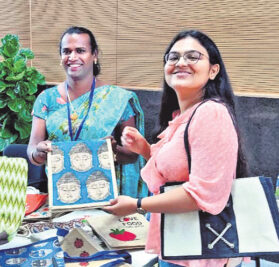
Success
Premleela, a 37-year-old transwoman, is an emerging entrepreneur who received training in making jute bags and has since become a notable figure gaining recognition across States. Her success, including securing stalls in major company offices such as Microsoft in Hyderabad, demonstrates that with the right opportunities and training, individuals from the transgender community can excel in the labour market.
It highlights the transformative potential of providing skill training tailored to the needs of transgender individuals. By equipping them with diverse skills, we can empower members of the community to access meaningful employment opportunities and contribute positively to the economy.
What the Act mandates
The Transgender Persons (Protection of Rights) Act, 2019, (India), mandates comprehensive protection for transgender individuals across various spheres of life. It prohibits discrimination in education, employment, healthcare, public services, access to goods and facilities, movement rights, residence, and political participation.
Transgender individuals have the right to reside in their households and must not face discrimination in employment matters. Educational institutions must offer inclusive education and facilities, while the government is tasked with providing healthcare services tailored to their needs, including HIV surveillance and sex reassignment surgeries.
Additionally, the Act requires the government to review medical curricula to address their health issues and implement comprehensive insurance schemes for their healthcare needs.
Establishments are obligated to designate complaint officers to handle grievances under the Act, ensuring its effective implementation. The Act provides for the establishment of a National Council for Transgender Persons, tasked with advising the central government on policy formulation, evaluating the impact of transgender-related initiatives, coordinating government and NGO activities concerning transgender issues, addressing grievances, and performing additional functions as directed by the Centre.
It acknowledges specific offences against transgender individuals, including forced or bonded labour (except for compulsory government service for public purposes), denial of access to public spaces, eviction from their households or communities, and various forms of abuse such as physical, sexual, verbal, emotional, or economic. Penalties for these offences range from six months to two years of imprisonment along with a fine.

Auth
(Anagha VS, K Ragasuriya, Maheswary S are pursuing MA Economicsat School of Economics, University of Hyderabad. The project was done under the guidance of Prof Gummadi Sridevi, from School of Economics, University of Hyderabad)
<!–
–>
Source | Powered by Yes Mom Hosting

